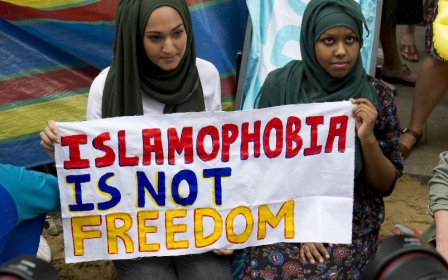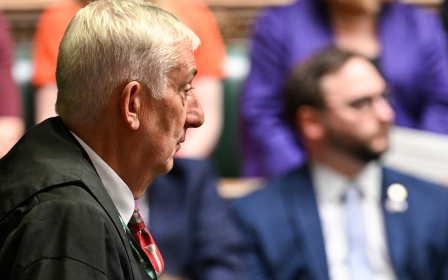UK Islamophobia: Why Schedule 7 must be immediately repealed

In April 2023, Ernest Moret, a French publisher working for Editions la Fabrique, was detained at St Pancras station while en route to a London book fair. He was held under Schedule 7 of the UK Terrorism Act 2000, and questioned by counter-terrorism officers about whether he had participated in anti-government demonstrations in France.
Moret’s mobile phone and laptop were confiscated for weeks, but returned to him after police opted to take no further action - although they confirmed they had downloaded his sim card before returning his phone. Moret had refused to provide his passwords.
Fast forward to today, and after Moret launched a legal challenge against the Metropolitan Police, the force has agreed to pay him “substantial” damages: a five-figure sum, plus his legal fees. Moret is also seeking a full and unequivocal apology from Commissioner Mark Rowley.
This is a welcome and hugely positive outcome. Credit goes to Moret for diligently pursuing his case, and to his legal team for securing this positive result.
I am no stranger to Schedule 7, and followed Moret’s case with personal interest. The outcome, though welcome, shines a necessary spotlight on our two-tiered legal system.
Stay informed with MEE's newsletters
Sign up to get the latest alerts, insights and analysis, starting with Turkey Unpacked
This is what happened to me. After a trip to Qatar in November 2016, I too was stopped upon my return under Schedule 7, and charged with willfully obstructing police when I refused to hand over the password and PIN number for my laptop and phone.
As managing director of the advocacy group Cage International, my work involves documenting highly sensitive information relating to accounts of torture and state repression. On this occasion, my laptop contained evidence from a survivor of US torture whom I had met in Qatar, Ali al-Marri, including the names of FBI agents that he shared with me to instruct British lawyers. I felt the full personal and professional weight of the trust this man placed in me.
Criminal offence
Being stopped at ports of entry is nothing new; it has happened to me more than 20 times. On two of these occasions, I was asked to hand over the passwords for my devices and declined, with no consequences.
This time was different. I was told that police had the right to demand access to electronic devices, and that my refusal to cooperate was a criminal offence.
As a human rights defender, I can see with painful clarity where this leaves the work of those campaigning against the excesses of state power. The confidentiality of clients is a cornerstone of the work we do, and my conviction lies only in my duty to protect that confidentiality.
The message playing loud and clear to minority communities is that standing up to protect the vulnerable will come at a higher personal cost when you are a British Muslim
My case exposed how there are no satisfactory protections for legally privileged material. And since I was not held as a result of a “random stop”, but for a collateral purpose, I now write as someone with a criminal conviction, rather than someone who received a payout and reimbursement of legal expenses.
Despite Judge Emma Arbuthnot confirming she understood that I was protecting sensitive information, she said she was bound by the law to convict me of an offence for doing so.
Both my case and Moret’s carry significant wider consequences for journalists, lawyers, NGO members, doctors and others carrying confidential information across UK borders. The message is this: a white European publisher can quash his Schedule 7 stop and receive a settlement, while a British Muslim director of an international advocacy group defending victims of state injustice can be charged and convicted.
What are the differences between these two cases?
Challenging power
State harassment has unfortunately become a fixture of the work I do, and it is something I accept as a consequence of campaigning against power.
The story of my charge and conviction was covered in the award-nominated film Phantom Parrot by Kate Stonehill, and I will never shy away from speaking out against state repression.
In 2019, Cage published a study revealing the discriminatory and Islamophobic nature of Schedule 7, widely condemned for being draconian, undermining civil rights and criminalising political dissent. But even a law as overbearing as this treats some as “more equal” than others.
Our call has always been clear: Schedule 7 must be immediately repealed and all of its victims adequately compensated for the impacts on their personal and professional lives. By conservative estimates, there have been more than one million people stopped over the past two decades, the overwhelming majority of whom were released with no further action.
We call for a full and transparent public inquiry into why mass surveillance on British citizens has been allowed to continue this long, and how to truly protect the civil liberties that have consequently been eroded.
The message playing loud and clear to minority communities is that standing up to protect the vulnerable will come at a higher personal cost when you are a British Muslim. My conviction has had lasting effects on my ability to do my job, and I believe this was the intended outcome.
When I was banned from entering France last year after giving a speech highlighting the country’s structural Islamophobia, one of the reasons given was my “UK terrorism conviction”. The word “terrorism” remains on record, although the reality is that I was prosecuted for protecting my client’s confidentiality.
These Schedule 7 stops do not remain unfortunate isolated incidents. Rather, they serve as long-term deterrents for people doing the work I do, in an attempt to quash dissent and censor essential human rights investigations.
In the murky web of state surveillance, this is one of the rare occasions where there is exceptional clarity: human rights defenders from minority groups will feel the full force of the law. Others will be given support, sympathetic publicity and generous compensation.
Schedule 7 has long stood in violation of basic standards of due process, disproportionately impacting Muslims and non-white people; its selective application now adds another dimension to the rot.
The views expressed in this article belong to the author and do not necessarily reflect the editorial policy of Middle East Eye.
Middle East Eye delivers independent and unrivalled coverage and analysis of the Middle East, North Africa and beyond. To learn more about republishing this content and the associated fees, please fill out this form. More about MEE can be found here.






